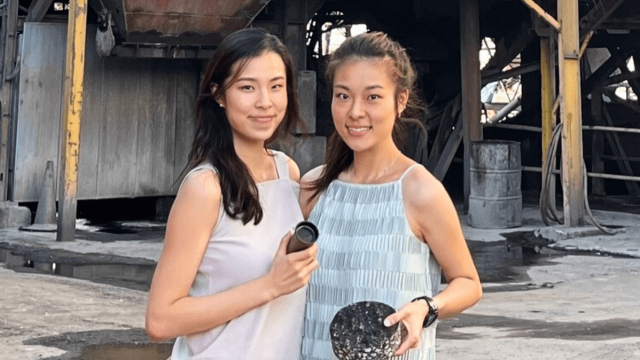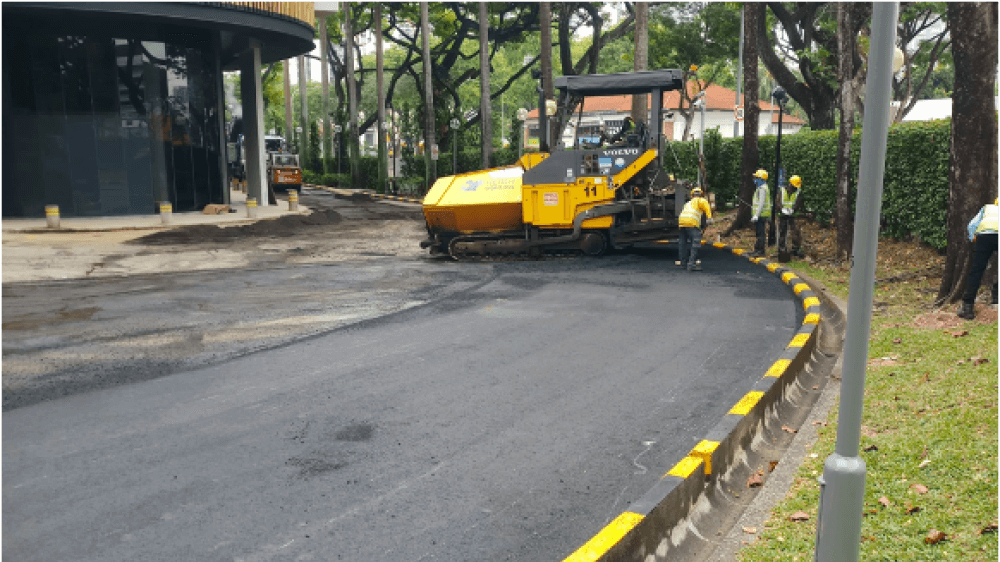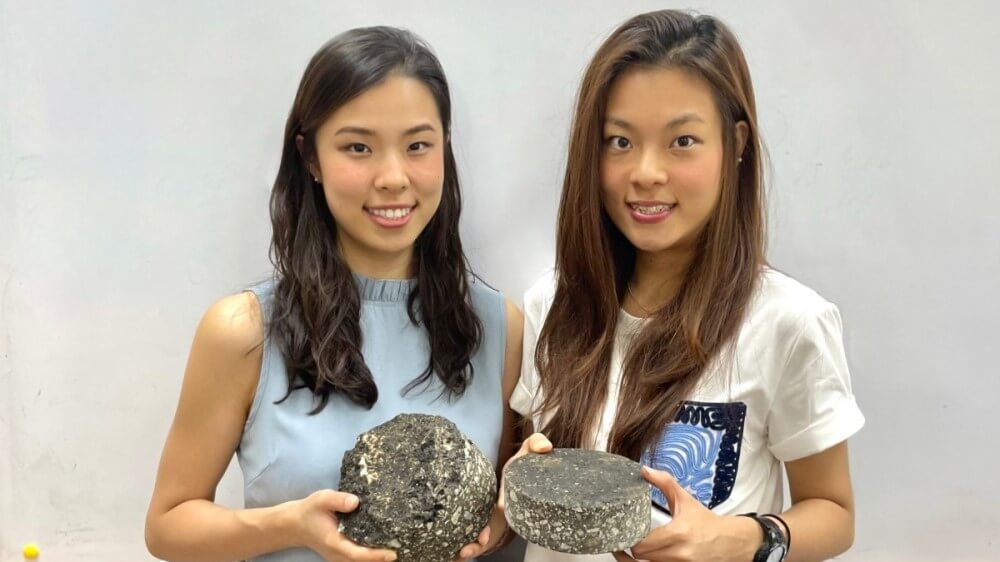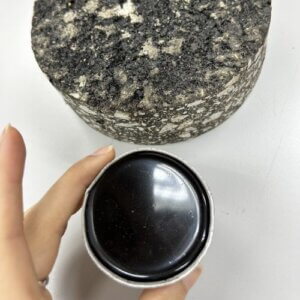
From Waste to Innovation: Magorium’s Vision for Sustainable Plastic Recycling
Oh Shu Xian, an alumna from the SMU School of Social Sciences, helped found Magorium – a start-up that converts used plastic into a new material called NEWBitumen. The new material is then used to build greener roads. Shu Xian shares her journey with the company so far and her thoughts on Magorium being chosen as a finalist in the Lee Kuan Yew Global Business Plan Competition (LKYGBPC), organised by SMU Institute of Innovation and Entrepreneurship (IIE).
It’s no secret that the world is on the brink of an environmental crisis.
As plastic-choked oceans and overflowing landfills bear witness to Singapore’s disposable culture, the imperative for recycling takes centre stage. Despite the city state’s drive to boost recycling, domestic recycling rates remain low. A National Environment Agency report reveals just 12 per cent of household waste is recycled. Plastic, a major offender, makes up 15 per cent of the overall waste generated here, yet only 6% of it finds its way to recycling.
This underscores the significance of innovative start-ups like Magorium. With a distinctive focus, Magorium’s proprietary recycling technology aims to breathe new life into plastic, while safeguarding our oceans from pollution and curbing the release of harmful gases from incinerators.
Oh Shu Xian, an alumna from the SMU School of Social Sciences, is part of the founding team of Magorium. The start-up was nurtured through SMU’s Business Innovation Generator (BIG) incubation programme, and is now one of the Revolutionary 50 (RVLT50) finalists in the prestigious Lee Kuan Yew Global Business Plan Competition (LKYGBPC), a biennial university start-up challenge in Singapore organised by the Institute of Innovation and Entrepreneurship (IIE) at SMU.
The competition, with the theme “Innovations Beyond Boundaries – Reimagining a Smart, Sustainable and Resilient Future”, aims to empower young founders like Shu Xian to tackle urgent global challenges through deep-tech solutions.
Sharing her thoughts on being selected as one of the RVLT50 finalists, she says, “This achievement is definitely a huge validation of Magorium – a testament to our years of work and the impact that we are creating. Above all, we also see this milestone as a step in the right direction to continue creating value for society.”
Resource-efficient plastic recycling
The team at Magorium recognises that plastic use can sometimes be a necessity. But conventional plastic recycling efforts occur on a modest scale, often with the precondition that the plastic is cleaned and meticulously sorted by type. This led to a lot of the recycling efforts going to waste, as plastic that is improperly sorted or contaminated can frequently find their way to incineration.
To tackle the challenges that come with traditional plastic-recycling methods, Magorium utilises a proprietary recycling technology that converts all types of used plastic into a sustainable material called NEWBitumen in an environmentally safe way. This substance is then used to construct greener roads. By the end of 2022, the start-up had successfully paved five of such green roads in Singapore, diverting more than 8,000kg of plastic waste from incineration.

The environmental benefits go beyond giving plastic a new lease of life. In traditional road construction, crude oil is used to produce bitumen for asphalt premix. Magorium’s NEWBitumen replaces this step, thereby reducing the environmental harms that occurs during the extraction, refinement, and transportation of crude oil and its byproducts.
Thriving in an environment that supports entrepreneurs
Shu Xian’s impetus to help found Magorium finds its origins partially in her family’s heritage. With two earlier generations in the road construction and asphalt-manufacturing businesses, tales of her father’s attempts to transform the industry served as a consistent backdrop of her growing up years.
Her sister and Magorium Founder, Oh Chu Xian, decided to follow in their father’s footsteps with this idea, and Shu Xian was inspired to join her on this journey. She confesses that the choice to take this leap was not easy – but her SMU experience got her there: “Being in SMU helped expose me to the world of entrepreneurship even from day one – I learnt that some food stores at school were actually students’ endeavours! This was only the beginning, and I soon started discovering more success stories and understanding more about the start-up scene, as well as the support available.”

Shu Xian also considers SMU’s BIG incubation programme to have been immensely valuable to Magorium’s journey. “The team behind the incubation programmes believed in us before we paved a single road. They facilitated connections with diverse networks, and administered opportunities such as panel speaking, mentorship and grants to propel us forward,” she shares. “We are extremely thankful for the invaluable support that they’ve extended to us up till today.”
The challenges of presenting a novel solution
In creating their solution to utilising plastic waste, Magorium fits in well with the LKYGBPC’s theme. The team hopes to transform two mature and relatively conservative industries – waste management and built environment – by challenging the status quo. This goal does not come without its challenges, as Shu Xian explains.
“Our solution is disruptive to many age-old processes, which caused us to face substantial push-back from potential stakeholders in our early years. Fortunately, we were able to gain the support from entities like SMU’s Business Innovations Generator (BIG) incubation programme, and secured the funding, pilot trials and partnerships that we needed. This in turn helped to increase our credibility in the field and reassured other stakeholders to place their faith in us.”

Another challenge that the team is diligently working to address comes in the form of a maze of regulations. These regulations, often underdeveloped due to a lack of precedence, can also be unnecessarily stringent in some cases. This is particularly pronounced for novel solutions like Magorium’s, which lack a standardised compliance framework for reference. “We have yet to overcome it entirely, but we are fortunate as Singapore is increasingly open to innovation, and government agencies have been extremely supportive in providing assistance and indicating interest to pilot our green technology,” shares Shu Xian.
Emerging as one of the RVLT50 finalists in the LKYGBPC fuels Magorium’s drive towards its next goal. Beyond the competition, Magorium is working hard to establish its presence in Singapore and envisions a global expansion in future.
Reflecting on her journey thus far, as well as her aspirations of success, Shu Xian says, “In becoming a success story, we hope to inspire more people to challenge legacy industries and traditional methodologies so we can progress together as an entire society.”
Magorium was a finalist in the Urban Solutions & Sustainability category of the 11th Lee Kuan Yew Global Business Plan Competition (LKYGBPC), a biennial university start-up challenge organised by the SMU Institute of Innovation & Entrepreneurship (IIE).




